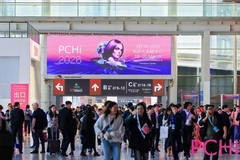Faster fragrance feedback: IFF’s AI tool offers real-time consumer insights to propel perfume innovation

IFF is advancing ways to leverage qualitative consumer data with a new AI-driven app that collects real-time consumer feedback to improve fragrance innovation. This comes at a time of increasing interest in AI solutions from personal care companies and brands looking to innovate faster and smarter by applying the latest digital technologies.
The company unveiled its research tool, ScentChat, earlier this week to incorporate insights for specific perfumes that consumers want to see on the market.
IFF claims ScentChat unlocks co-creation opportunities by connecting directly with leading messaging platforms using advanced semantic AI and natural language processing (NLP).
Commercial fragrance creation
NLP is a machine learning technology that allows computers to interpret, manipulate, and comprehend human language, while semantic AI interprets the intent of content, not just the exact words.

ScentChat allows for direct communication between consumers and fragrance creators via popular messaging platforms like WhatsApp and Facebook Messenger, which happens in real-time.
It mirrors the dual nature of fragrance creation by combining human experience with technology, according to Clotilde Raz, senior manager, Global Human and Consumer Insights, Scent, at IFF.
“The app is a huge leap forward, making innovation more efficient, immersive, and impactful. We’re already smelling unique, consumer-loved creations from our artists of perfumery based on this exciting new resource,” she says.
AI driving fragrance innovation
IFF’s ScentChat launch is among the growing AI-driven solutions being adopted by the personal care industry. Some focus on developing a personalized, scientifically accurate, and virtual experience to inform consumers and predict what works best for the individual.
 AI is tranforming the personal care indsutry from skin care to fragrance creation.The velocity of AI-driven innovation is expected to gain traction in 2025, with companies developing new ways to anticipate and deliver what consumers want.
AI is tranforming the personal care indsutry from skin care to fragrance creation.The velocity of AI-driven innovation is expected to gain traction in 2025, with companies developing new ways to anticipate and deliver what consumers want.
Haut.AI launched SkinGPT commercially last week. It uses AI to create synthetic images illustrating how skin can change over time due to environmental factors and skin care products. The technology simulates the effects of skin care products and treatments. The company also unveiled Generative.Skin: Library of Ingredient Effects, a website for users to explore how skin care ingredients impact their skin.
In January, L’Oréal revealed that it is partnering with IBM to develop a custom generative AI model that will speed up cosmetic formulation processes. The tool will improve formulation discovery. However, it was mainly used to help L’Oréal source raw materials and reduce energy and material waste, thus supporting the French multinational personal care corporation’s sustainability goals.
Another example comes from tech company Revieve, which specializes in AI for the beauty industry, helping brands and retailers deliver personalized AI-driven experiences, specifically around skin health, beauty, and wellness.
AI supports the art of perfumery
Personal Care Insights recently interviewed CEO and co-founder Sampo Parkkinen about the company’s partnerships with personal care brands to create beauty advisor tools and virtual try-on experiences.
Another move that demonstrates the significance of the personal care industry adopting AI-powered solutions and tools came in June 2024 when Unilever said it was scaling up AI-powered tools to help consumers make customized product choices, drive differentiation, and spark sales for its beauty brands, including Dove and Pond’s products.
One illustration of Unilever’s AI-powered innovation is Axe A.I. Body Spray, developed with Swiss fragrance company Firmenich using 46 terabytes of data, 6,000 ingredients, and 3.5 million potential fragrance combinations to create one scent. The limited-edition fragrance was driven by Gen Z’s fascination with the world of tech and crypto.
The giant also tapped AI-powered data analysis to research the microbiome and its role in stimulating the immune system and keeping the skin healthy.













